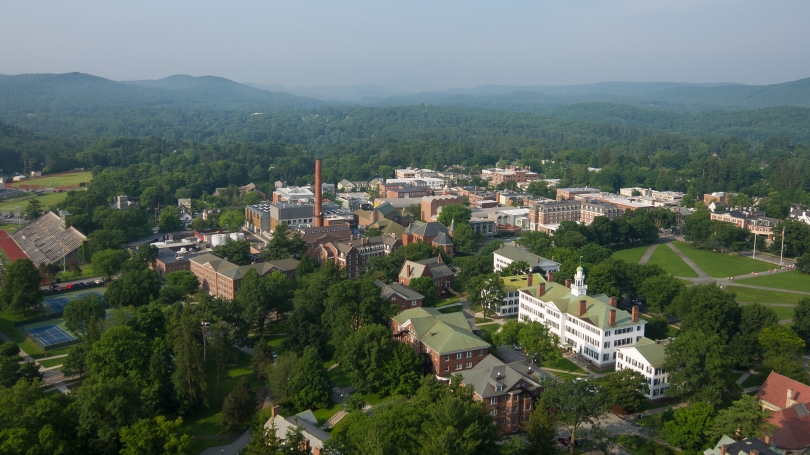
'Sparking' Research About Life During the Pandemic
Posted on June 18, 2020 by Charlotte Albright
The topics are "fascinating, creative, and timely," says Dean Madden, vice provost for research.
Only a few weeks after the novel coronavirus began taking its grim toll, Dartmouth scholars from a range of disciplines got to work, in direct response to the health crisis, on innovative projects. The funding came through the Office of the Provost, thanks to an anonymous donation supporting "Spark" grants, averaging about $7,000 per initiative.
"So far we have supported nine projects, totaling nearly $63,000, with an additional $13,400 from other sponsors, including The Dartmouth Institute, the Nelson A. Rockefeller Institute for Public Policy, the Tuck School of Business, and the Dartmouth Center for the Advancement of Learning," says Dean Madden, vice provost for research. "This is truly a campus-wide effort, and the topics are fascinating, creative, and timely."
Assessing Access to Medical Care
Some of the research addresses issues of medical access during this critical time. For example, Judy Rees, an associate professor of epidemiology at the Geisel School of Medicine, is studying "COVID-19 in New Hampshire," providing essential longitudinal data to guide public policy decisions in the state.
Elizabeth Carpenter-Song, a research associate professor of anthropology; Anne Sosin, program director for the Global Health Initiative at the John Sloan Dickey Center for International Understanding; and Lisa Adams, associate dean for global health and an associate professor of medicine in the Section of Infectious Disease and International Health at Geisel, are investigating "The Need for Rapid Research to Assess Impact of COVID-19 in the U.S.," with a particular focus on the impact of the disease in rural environments.
Daisy Goodman, assistant professor of obstetrics and gynecology, and of community and family medicine at Geisel and assistant professor at The Dartmouth Institute, and Ilana Cass, chair and professor of obstetrics and gynecology at Geisel, are evaluating cell phone deployment "to reduce disparities in access to telemedicine for rural, low-resource pregnant women during the COVID-19 pandemic."
"This program is critically important now because pregnant people and families are experiencing high levels of anxiety and isolation," says Goodman. "Lack of access to technology has widened disparities in care and threatens to widen disparities in outcomes."
Learning About Response to Disease
Two projects address the impact of COVID-19 on vulnerable populations. Sienna Craig, associate professor of anthropology, is looking at "Structural Inequality and Epidemiological Invisibility: Himalayan New Yorkers Respond to COVID-19," investigating the need for culturally aware communications with diverse communities.
Abigail Neely and Patricia Lopez, both assistant professors of geography, are tracking "The Social and Political Implications of COVID-19 for Care Labor in the U.S.," evaluating differences in the experiences among caregivers in rural and urban communities.
Ellie Kyung, an associate professor of business administration at the Tuck School of Business, is looking into the way people are responding to the unprecedented health threat, with "COVID-19 Risk Perceptions and Behavioral Compliance."
Mathematics and computer science are also represented in the Spark cohort. Daniel Rockmore, associate dean for the sciences and the William H. Neukom 1964 Distinguished Professor of Computational Science, and John Bell, lead applications developer for Information, Technology and Consulting, are collaborating on "Learning from COVID to Innovate New Digital Pedagogy." Temiloluwa Prioleau, assistant professor of computer science, is using artificial intelligence approaches to capture evanescent social-media data from survivors with "The Insider Scoop on COVID-19."
"Love in the Time of Corona"
Perhaps the most unconventional project bridges physics and film. Iyabo Kwayana, assistant professor of film and media studies, and James Whitfield, assistant professor of physics, have begun to make a movie called Love in the Time of Corona: A Story About COVID-19. Quantum Entanglement, and the Myth of Separation. Part fiction, part fact, the plot revolves around a philosophical quantum physicist named Ananda, who is thrown into an existential crisis by forced isolation during the 2020 global pandemic, which is then exacerbated by an explosion of social unrest.
"These events thrust her into an internal journey that leads to a breakthrough in her understanding of both quantum physics and the structures that separate humanity, and those that bind us together," says Kwayana.
"The grant will help us begin a series of interviews with a wide array of thought leaders—physicists and biologists, artists and humanists—offering different visions of what the world might become in relation to COVID-19."
From cinema to computer science, the Spark projects show the power of interdisciplinary innovation, says Madden.
"What's really exciting is the diversity of this snapshot of academic response to COVID-19. The pandemic is impacting all areas of life. This is exactly the kind of challenge that cries out for the full spectrum of contributions offered by the liberal arts."